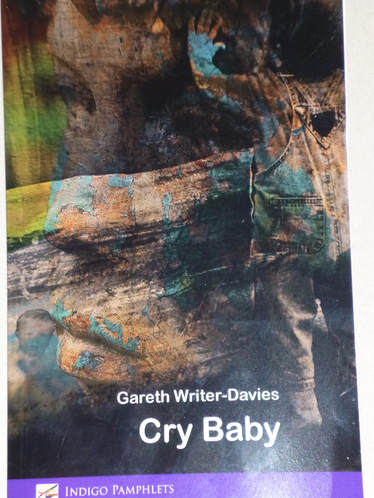Cry Baby
Indigo Dreams Publishing
978-1-910834-51-0
Based in Brecon, Wales, Gareth Writer-Davies has been commended in the Prole Laureate Competition, the Welsh Poetry Competition and the Sherborne Open Poetry Competition. He has also been twice shortlisted for the Bridport Prize. Cry Baby is his second pamphlet published by Indigo Dreams after Bodies in 2015.
Readers of Gareth Writer-Davies’ earlier booklet, Bodies will remember his use of the striking phrase, his ability to sweep aside over-sentimentality and cut through to the bone. Often visceral and disturbing, Bodies was not an easy read. Cry Baby though, creates a different immediate impression where all of the poems are built up of two and three-lined stanzas. The effect is like seeing all of the parts of a jigsaw spread out on the floor and the reader must sift through them all to piece together for the telling image, the combination of words which will continue to resonate after turning the page.
But you don’t have to look far for impact. The title poem of the collection begins with the lines:
I was made
in a black iron bed.
The poem concerns ambiguous gender identity, a denial of expectations:
I was not the imagined girl
ready for gingham ribbons and ankle socks.
Instead the narrator refers to: a hunter of foxes, cornet in a military band and designer frocks. (my italics) It is not a clear-cut identity which is being presented. “I was something else,” we are told, and here we are left in no doubt about the life force present. In the final stanza we recognise the ironic use of the title, Cry Baby. The something else was:
a fist of a child
who bit my mother’s breast
and kicked out at rainbows.
Thereafter, Cry Baby is an examination of growing up in a fractured family, where parental discord affects the development of the child. In The Train Is Coming, the poet recounts his experience as a toddler on his first trip to London, of how his imaginative responses were inadequately shared.
but my parents’ inabilities
were clear
as we bumped along the track
Finally, the toddler is separated from his parents at Kentish Town. They are
two hundred feet below
lost in the puzzle of the map
and his response?
I cried
as though
my heart were broken
Again, the italics are mine. The expected emotional response is clear but the crying here is manufactured. Genuine distress would eliminate the need for as though, genuine distress would be triggered by the perceived loss of love and the warmth of the human bond. You will look in vain for such things in this collection as the narrator feels compelled to play a role, a motif which is ever-present.
The parental relationship continues to be ruthlessly exposed and the effect on his own childhood is vividly charted. Autobiographical poetry here is not a byword for cosiness. Episodes are recounted: elocution and piano lessons, fishing expeditions and swimming at Aberdovey, all of them with a downbeat pay-off. Life, it seems, is a long sentence for the “fat kid” who “liked being a girl” and never doubted he would be a “star of stage and screen.”
Throughout Cry Baby, the poems are lean and spare, not a word is wasted and the discomfort is all too real. The effort made to sift through those jigsaw pieces is well rewarded, readers will emerge from this collection knowing that they have been taken face to face with hurt and confusion. It is a bruising encounter but a recommended read all the same.

 RSS Feed
RSS Feed
